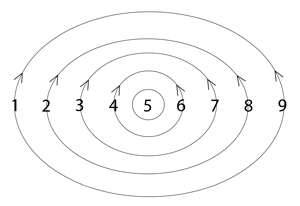feeling
1-3-4
Conventional Understanding
We’ve been taught that feeling is just our emotional reactions and physical sensations – something that happens *to* us when we encounter situations or thoughts. Feelings are typically viewed as subjective internal experiences that need to be managed, interpreted, or sometimes even suppressed in favor of “rational” thinking. This hierarchy runs deep in our culture – just notice how often people say “don’t be so emotional” or “think logically” when important decisions arise. Schools train us to trust abstract reasoning over bodily knowing, creating a disconnection that shapes nearly every aspect of our lives. The message is clear: your feelings are unreliable and secondary to your thoughts.
Resonant Understanding
Word Cosmology reveals “feeling” shares the same resonance pattern (1-3-4) as “body knowing” and “creative medium,” suggesting something quite different from our conventional view. Rather than being just subjective reactions, feeling appears to function as a primary intelligence – a direct way of knowing reality without needing conceptual translation.
Think about how your hand knows water temperature instantly – there’s no analysis needed, just immediate recognition. Musicians talk about “feeling the music” rather than analyzing it, and they’re describing something real – direct participation in patterns they know through their bodies. This isn’t feeling as reaction but as immediate intelligence that precedes thinking entirely.
Expressions Spectrum Analysis
In balance, this pattern appears as “beingness” and “potentiality,” showing feeling as our direct connection to creative possibility. “I honor who I am” and “body knowing” reveal how balanced feeling establishes self-acceptance and direct intelligence. It’s not emotional reaction but immediate recognition – knowing through being rather than analyzing.
When over-modulated, expressions like “a feeling of power” and “I am an authority” appear, showing how this direct knowing gets weaponized for control. “Attention on a thought” reveals feeling becoming fixated on mental constructs rather than staying responsive to experience. “Manipulate” shows how emotional force becomes instrumental rather than receptive.
When under-modulated, expressions like “blank” and “I am cut off” reveal what happens when we lose touch with this intelligence. “Anxious” and “watching” show the discomfort of observing experience from a distance rather than knowing it directly. Interestingly, “virtual world” appears in both rigid and disconnected states, suggesting we create artificial realities when we lose touch with direct feeling.
Beyond these patterns, words like “silence,” “matrix,” and “creative medium” share this resonance, hinting at feeling’s connection to fundamental aspects of reality itself.
Russell’s Cosmogony Connection
Walter Russell’s understanding of reality helps illuminate why feeling functions as direct intelligence. He writes:
“Every action-reaction in Nature is voided as it occurs, is recorded as it is voided, and repeated as it is recorded.”
This describes exactly how feeling works – as the immediate recording and recognition of patterns. Not through analysis but through direct participation. Think of a surfer feeling the wave – they’re not calculating physics but directly participating in patterns they recognize through their body.
Russell further explains:
“The heartbeat of the universe is eternal.”
This points to feeling as participation in universal rhythm. Just as musicians don’t just hear the beat but feel it in their bodies, feeling isn’t just registering experience but directly participating in the patterns that constitute reality.
Practical Implications
This view transforms how we might approach both personal growth and education. Instead of treating feelings as unreliable reactions that need management, we might recognize them as our primary intelligence – our direct line to knowing reality before conceptual thought intervenes.
Imagine educational environments that valued “body knowing” alongside abstract reasoning – teaching children to develop somatic awareness as much as analytical skills. This could transform everything from math (feeling patterns before formulas) to conflict resolution (feeling connection before argumentation).
This challenges our culture’s privileging of abstract reasoning over direct experience. When disconnected from the intelligence of feeling, we become more easily manipulated – unable to recognize the dissonance between what we’re told and what we directly know.
By reclaiming feeling as primary intelligence rather than secondary reaction, we open ourselves to more integrated knowing that honors direct experience alongside conceptual understanding. The wisdom might be as simple as trusting what we already feel.
Walter Russell’s quotes are from his book, “A New Concept of the Universe”.
Related Words:
No results found.


